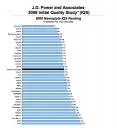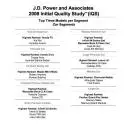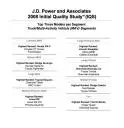DAILY - UPDATED
KIA NEWS
&
SPY SHOTS
REVIEWS
SALES REPORTS

2008 Initial car quality study released by J.D. Power
J. D. Power and Associates has released 2008 Initial Quality Study, which measures car quality in the first 90 days of ownership. Overall industry-wide quality improved by 6 percent, with the number of problems per 100 vehicles falling to 118 from last year’s average of 125.
Among 36 nameplates included in a study, Porsche took first place for the third consecutive year with 87 problems per 100 vehicles. It was closely followed by Japanese duo, Infiniti 88 ( jumped from 9th place in 2007 to 2nd in 2008) and Lexus 89. Fourth was Mercedez-Benz tied with Toyota.
Other brands in the top 10 were Honda with 110, Ford and Jaguar with 112, and Audi, Cadillac and Chevrolet with 113 problems per 100 vehicles. Hyundai, Pontiac and Lincoln also rated above average, while Kia ranked just a spot below this year’s industry avearge.
Follow the jump to read the official press release…
Press release:
WESTLAKE VILLAGE, Calif.: 4 June 2008 – Initial quality in the automotive industry has improved significantly in 2008, with substantial gains demonstrated by nearly three-fourths of the 36 ranked nameplates, according to the J.D. Power and Associates 2008 Initial Quality StudySM (IQS) released today. Overall quality improves to 118 problems per 100 vehicles (PP100) in 2008, down from 125 PP100 in 2007.
“Due to some strong new-vehicle launches, in addition to a continued reduction in the level of defects and malfunctions, overall quality improves by 6 percent in 2008, compared with 2007,” said David Sargent, vice president of automotive research at J.D. Power and Associates. “This gain is driven not only by strong advances from many of the high-volume brands such as Chevrolet, Ford and Toyota, but also by very significant improvements by many other automakers. This industry-wide improvement is a testament to the effort that automakers are putting into listening to the voice of the customer, and the hard work they have undertaken to integrate that feedback to design, engineer and manufacture better-quality vehicles. From working closely with the industry, we see the importance that is placed on initial quality. Vehicle manufacturers and consumers alike are reaping the rewards of this effort.”
The Initial Quality Study serves as the industry benchmark for new-vehicle quality measured at 90 days of ownership. The study is used extensively by vehicle manufacturers worldwide to help them design and build better vehicles and by consumers to help them in their vehicle purchase decisions. Initial quality has been shown over the years to be an excellent predictor of long-term durability, which can significantly impact consumer purchase decisions. The study captures problems experienced by owners in two distinct categories-quality of design and defects and malfunctions.
The study finds that 86 percent of the overall improvement is due to advances in eliminating defects and malfunctions. Minimizing design problems remains a major challenge for the industry, particularly since new technology, such as navigation and entertainment devices, is becoming increasingly common in today’s new vehicles.
“As consumer demand for new and more advanced wireless communication, navigation and audio technology continues to grow, manufacturers face challenges related to how well these systems are integrated into their vehicles,” said Sargent. “In particular, issues with difficult-to-use audio and entertainment controls and voice command recognition failure are among the top ten problems most frequently reported by customers. Since hands-free communication for drivers will become a mandate in more and more areas throughout the U.S., this will need to be an area of continued focus for automakers.”
The study also finds that new-vehicle sales patterns in 2008 have shifted away from the largest models and toward smaller models.
“This shift in sales preferences among new-vehicle buyers is in part a response to rapidly increasing fuel prices,” said Sargent. “The good news for consumers in this difficult environment is that they can downsize with confidence, as there are many models with high initial quality in the smaller-vehicle segments. J.D. Power and Associates forecasts that 28 new compact-vehicle models will launch by 2010, and it will be particularly important for manufacturers to ensure high initial quality in these launches.”
2008 IQS Ranking Highlights
Honda models capture three segment awards-more than any other nameplate in the 2008 study-for the Civic, CR-V and Fit. Garnering two segment awards each are: Chevrolet (Malibu and Silverado LD); Dodge (Dakota and Durango); Infiniti (EX-Series and M-Series); Lexus (LS and RX); and Mercedes-Benz (CLK-Class and E-Class). The Porsche 911 has the fewest quality problems in the industry, with just 67 problems per 100 vehicles. Also receiving segment awards are the Ford E-Series, Lincoln Navigator, Mazda MX-5 Miata, Pontiac Grand Prix Sedan and Toyota Sequoia.“In past years, automakers have frequently struggled to achieve very high initial quality with new models,” said Sargent. “With product launches and redesigns often being problematic for manufacturers from a quality standpoint, it is particularly impressive that the Chevrolet Malibu and Infiniti EX-Series achieve such high levels of quality that they receive awards in their launch year.”
For a third consecutive year, Porsche tops the overall nameplate rankings, averaging 87 PP100. Following in the rankings are Infiniti (which improves from 9th rank position in 2007), Lexus, Mercedes-Benz and Toyota, respectively. Audi posts the largest improvement in ranking, moving from 26th place in 2007 to 10th in 2008.
“Porsche continues its steady improvement and has succeeded in distancing itself from the second-ranked nameplate to a greater degree in 2008-by a gap of 11 PP100-compared with 3 PP100 in 2007,” said Sargent.
Assembly Plant Awards
The Mercedes-Benz assembly plant in Sindelfingen, Germany, receives the Platinum Plant Quality Award for producing vehicles yielding the fewest defects and malfunctions. Averaging just 33 PP100, the plant produces the Mercedes-Benz CL-Class, CLS-Class, E-Class Sedan, E-Class Wagon and S-Class. Plant awards are based solely on defect and malfunction counts.Among North and South American plants, the Toyota plant in Baja California, Mexico, which produces the Toyota Tacoma, achieves the Gold Plant Quality Award.
In the Asia Pacific region, Toyota’s Fujimatsu, Japan, plant, which produces the Toyota Prius, receives the Gold Plant Quality Award.
The 2008 Initial Quality Study is based on responses from more than 81,500 purchasers and lessees of new 2008 model-year cars and trucks surveyed after 90 days of ownership. The study is based on a 228-question battery designed to provide manufacturers with information to facilitate problem determination and drive product improvement. The study was fielded between February and April 2008.
Find more detailed findings on new-vehicle quality performance as well as model photos and specs by watching a video, reading an article and reviewing quality ratings at JDPower.com. [Source: J.D. Power and Associates]



hmm, so Kia has to work harder in the quality dept.
more TD spy shots!!! I cant wait. what time is “later today”?
The declaration that American cars are narrowing the gap is somewhat misleading: While it is true, as a whole, they are making gains — the real numbers that matter to consumers is the individual cars in a particular class. For example, the top three classes of cars are: Truck, Mid-sized sedan, and SUV. Toyota dominates in these classes. Just because Americans can do cars that few people drive better — isn’t exactly the best accomplishment.
I tell all my friends to buy foreign still. And to use the power of competition to get a good price (ignore clever marketing). This is the best process to use when you are ready for a car: